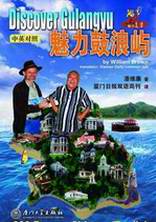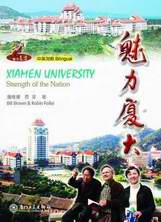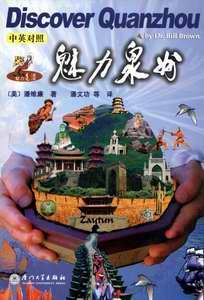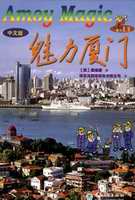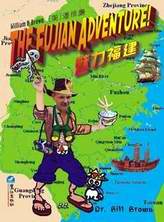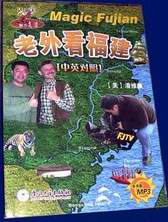![]() Click
to
Access
Click
to
Access
AMOY MAGIC SITE from
OUTSIDE China
![]() Click
to Access Amoy
Magic Site from
Click
to Access Amoy
Magic Site from
INSIDE
China ![]()
TRAVEL LINKS
![]() Xiamen
Xiamen
![]() Gulangyu
Gulangyu
![]() Jimei
Jimei
![]() Tong'an
Tong'an
![]() Jinmen
Jinmen
![]() Zhangzhou
Zhangzhou
![]() Quanzhou
Quanzhou
![]() Wuyi
Wuyi
![]() #1Fujian
Sites!
#1Fujian
Sites!
![]() Fujian
Foto Album
Fujian
Foto Album
![]() Books
on Fujian
Books
on Fujian
![]() Readers'Letters
Readers'Letters
![]() Ningde
Ningde
![]() Zhouning
Zhouning
![]() Longyan
Longyan
![]() Sanming
Sanming
![]() Putian
Putian
![]() Bridges
Bridges
![]() Travel
Info,
Travel
Info,
![]() Hakka
Roundhouses
Hakka
Roundhouses
![]() Travel
Agents
Travel
Agents
MISC. LINKS
![]() Amoy
People!
Amoy
People! ![]()
![]() Darwin
Driving
Darwin
Driving ![]()
![]() Amoy
Tigers
Amoy
Tigers
![]() Chinese
Inventions
Chinese
Inventions
![]() Tibet
in 80 Days
Tibet
in 80 Days![]()
![]() Amoy
Vampires!
Amoy
Vampires!
![]() Dethroned!
Dethroned!
![]()
![]() Misc.Writings
Misc.Writings
![]() Latest
News
Latest
News
![]() Lord
of Opium
Lord
of Opium
![]() Back
to Main Page
Back
to Main Page
![]() Order
Books
Order
Books![]() Xiamenguide
Forum
Xiamenguide
Forum
Note:
Please click thumbnails for larger photos
![]() Hills'
Photo Album!
Hills'
Photo Album!![]() Bio
of Jessie M. Johnston
Bio
of Jessie M. Johnston
(A private letter by A.L. Warnshuis to Mrs. Otte)
![]() Download
PDF File of "Last 10 Days"
Download
PDF File of "Last 10 Days"
![]() Dr.John
Otte Page
Dr.John
Otte Page
![]() John
Otte Memorial
John
Otte Memorial ![]() The
Fuh-Chau Mission Cemetery
The
Fuh-Chau Mission Cemetery
Note:
Ms. Joanne M. Finley, M.D., granddaughter of John
Otte and daughter of Major Frank Otte,
kindly scanned for me A.L. Warnshuis' ten page letter written after attending
to Dr. Otte, who died of the plague contracted
from a Muslim patient in the Amoy mosque.
October 30,2007, John DeVelder
wrote to Joann Hill, "I was
moved by the Warshuis letter on Dr. John Otte. I remember the wife in
Holland, Michigan being so short but so "mighty" in her bearing
and opinions."
Chioh-khut, Kulangsu,
AMOY. April 19, 1910.
My dear Mrs. Otte,¡ª
I hardly know how
to begin this letter. It is a letter that I hoped I might never have to
write. But it is in accordance with Dr. Otte¡¯s
repeated request that I am writing it. Some three or four times he asked
me,---¡°Warnshuis, you will write a good letter to my wife, won't you?¡±
Each time I replied that I would do all I could but I hoped that he might
write the letter himself. Our hopes have been entirely disappointed, and
I must now do the best I can to fulfill my promise to the Doctor. I shall
try to give you as clearly as possible a full description of the Doctor¡¯s
illness and death.
![]() Back
to Top
Back
to Top
On Wednesday evening, April 6th, the Doctor came home to dinner and told
us of an experience he had that afternoon. He said he had been called
to see a patient in the walled city of Amoy,
near the Mohammedan mosque. Just as he was examining
him, the man threw up a lot of sputum over the doctor's hands. The doctor
had already diagnosed the case as one of pneumonic plague, and so made
haste to get his hands cleaned. He said to us that fortunately he found
that they had some creosol in the house, and he at once washed his hands
with that as well as he could. Then he hurried back to the hospital, keeping
his hands in his coat pockets so that he might not forget and use them
in any way. One of the students tells me that he met the doctor coming
back from Amoy that afternoon and he noticed
that with one hand ha was holding the other in his pocket so as to make
sure that he would not use it. So the doctor told us that be thought he
had taken all possible precautions, and he did not fear any ill results.
Exposed as we so often are to infectious diseases, none of us perhaps
paid enough attention to this incident, and most of us forgot about it
in a short time.
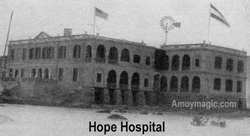 On
Sunday, I was away on Amoy Island, and when
I came back in the evening he said to me that he had had a very quiet
day and one that had been very restful. He said that he had felt unusually
tired, and for that reason he bad purposely spent the day quietly. Since
we returned to Amoy this time, Dr. Otte had constantly been complaining
of feeling very tired, so that I paid little attention to his remark on
Sunday. It is only now as I think back that I recall that he said this
and had said it with perhaps more emphasis than usual.
On
Sunday, I was away on Amoy Island, and when
I came back in the evening he said to me that he had had a very quiet
day and one that had been very restful. He said that he had felt unusually
tired, and for that reason he bad purposely spent the day quietly. Since
we returned to Amoy this time, Dr. Otte had constantly been complaining
of feeling very tired, so that I paid little attention to his remark on
Sunday. It is only now as I think back that I recall that he said this
and had said it with perhaps more emphasis than usual.
![]() Back
to Top
Back
to Top
On Monday afternoon, at about five o¡¯clock the Doctor came home but I
was busy at my desk, and so I did not speak to him at that time. When
I went in to supper, Mrs. Warnshuis remarked to me that we need not wait
for the doctor because he was not feeling well and had gone to bed. Immediately
after supper, I went upstairs to see him, and found him in bed suffering
from a bad chill. He was covered with all the blankets that he could find,
and yet was not warm, so I added his overcoat to his covering. We jollied
him a bit about having malaria now after having been practically immune
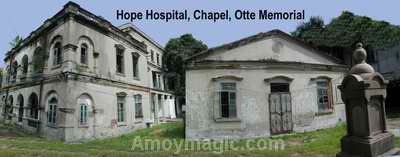 for
so many years. Yes, he said, perhaps I'll have more sympathy with malaria
patients after this. As there was nothing that we could do for him then,
we went to the usual mission prayer meeting. There I spoke of Dr Otte
having chills and fever, and after prayer meeting Dr Bonthius came in
to see him. I spent just a few moments with him then, and as again there
was nothing for me to do I left the two doctors together. When Dr Bonthius
came out of the room, he said that he thought we were right in guessing
that it was malaria. So we left him for the night.
for
so many years. Yes, he said, perhaps I'll have more sympathy with malaria
patients after this. As there was nothing that we could do for him then,
we went to the usual mission prayer meeting. There I spoke of Dr Otte
having chills and fever, and after prayer meeting Dr Bonthius came in
to see him. I spent just a few moments with him then, and as again there
was nothing for me to do I left the two doctors together. When Dr Bonthius
came out of the room, he said that he thought we were right in guessing
that it was malaria. So we left him for the night.
Tuesday morning early I went into his room and found that he was still
very miserable. Dr Bonthius came early and spent the morning with him.
That morning Dr Otte suffered terrible pains in every part of his body,
but this is not unusual in malaria, and as there were no other symptoms
it was impossible to do anything. Tuesday afternoon, these pains seemed
to be much less. Dr Bonthius was with him most of the time then. In the
evening, Dr Otte asked that his boy might sleep in the room with him,
so that if he needed anything he could get it easily. We expected that
the attack would soon end, and so we agreed to this as it did not seem
to us that he would need much care during the night, for he already seemed
to be more comfortable.
![]() Back
to Top
Back
to Top
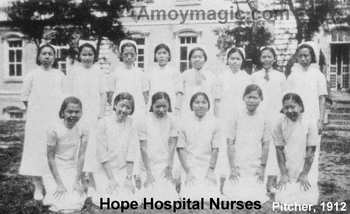 Wednesday
morning again at an early hour I went into his room, and to my surprise
found him no better but apparently with a high fever. Dr Bonthius also
continued to show his deep interest in Dr Otte, and came in as soon as
he could. He examined him carefully, but excepting the continued fever
he could find no symptoms that indicated anything different than malaria.
Dr Otte however was very miserable Indeed. He himself evidently suspected
something more serious than malaria. On Monday and Tuesday he would permit
Dr Bonthius to do scarcely anything for him, but now he submitted without
any objection. When I went into the room after breakfast, he asked me
to go to his room in the hospital and to get from the top of his desk
some notes which he had written for his will and to copy these so that
he could sign them, and also to get some letters which he had written
but not yet mailed. Dr Bonthius stayed with him that morning again, and
I went to the Theological Seminary as usual. However I started earlier,
and so went to the hospital first to get the papers he had mentioned.
For although I assured him when he had asked me to do this that it seemed
entirely unnecessary to me and that I thought he could prepare his will
at his own leisure in a few days, still I thought I ought to do what he
asked so as to relieve his mind as much as possible. I found the notes
for his will, ready on his desk as he said, and the letters in a drawer.
Two of the letters were of no importance, addressed to local parties,
the third letter was for Dr. Henry Hulst. Knowing that Dr Hulst was an
intimate friend, I did not then think anything further about this letter,
but mailed it by the first steamer. During the last few days I have been
wondering whether that letter to Dr Hulst was not written when the Doctor
began to suspect that he might have plague and so might contain his own
account of the way in which he caught the terrible disease. In any ease
it is perhaps the very last letter which he wrote.
Wednesday
morning again at an early hour I went into his room, and to my surprise
found him no better but apparently with a high fever. Dr Bonthius also
continued to show his deep interest in Dr Otte, and came in as soon as
he could. He examined him carefully, but excepting the continued fever
he could find no symptoms that indicated anything different than malaria.
Dr Otte however was very miserable Indeed. He himself evidently suspected
something more serious than malaria. On Monday and Tuesday he would permit
Dr Bonthius to do scarcely anything for him, but now he submitted without
any objection. When I went into the room after breakfast, he asked me
to go to his room in the hospital and to get from the top of his desk
some notes which he had written for his will and to copy these so that
he could sign them, and also to get some letters which he had written
but not yet mailed. Dr Bonthius stayed with him that morning again, and
I went to the Theological Seminary as usual. However I started earlier,
and so went to the hospital first to get the papers he had mentioned.
For although I assured him when he had asked me to do this that it seemed
entirely unnecessary to me and that I thought he could prepare his will
at his own leisure in a few days, still I thought I ought to do what he
asked so as to relieve his mind as much as possible. I found the notes
for his will, ready on his desk as he said, and the letters in a drawer.
Two of the letters were of no importance, addressed to local parties,
the third letter was for Dr. Henry Hulst. Knowing that Dr Hulst was an
intimate friend, I did not then think anything further about this letter,
but mailed it by the first steamer. During the last few days I have been
wondering whether that letter to Dr Hulst was not written when the Doctor
began to suspect that he might have plague and so might contain his own
account of the way in which he caught the terrible disease. In any ease
it is perhaps the very last letter which he wrote.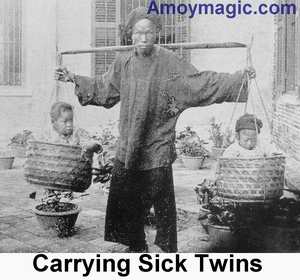
![]() Back
to Top
Back
to Top
When I came home Wednesday noon, I found that he was no better and perhaps
worse. He himself was now suggesting that he might have typhoid fever.
But Dr. Bonthius could not find some of the common symptoms of typhoid
and so did not agree with him. I should have mentioned above that David
had been to see him several times on Tuesday and also on Wednesday, and
David also could not find anything to help diagnose the case to be anything
other than malaria as the first symptoms had suggested. Dr. Snoke came
in from Siokhe that afternoon as he had planned to do in order to spend
a few days here and to arrange with the contractors for the rebuilding
of the Siokhe Hospital. Before coming to the house he went to Hope
Hospital to bring some patients there whom he had brought down from
Siokhe. At the Hospital the students told him that Dr Otte was ill and
that it might possibly be typhoid fever. Dr. Bonthius had already sent
for the hospital microscope in order to make a careful examination and
to determine for sure whether or not it was a case of typhoid or only
a case of malaria. Dr Snoke had two of the students whom Dr Otte had specially
trained in the use of the microscope in diseases assist in this microscopic
examination. The result of this examination was entirely negative so far
as typhoid was concerned and there were some malaria microbes in the blood.
To test the matter farther large doses of quinine were then prescribed
and as the doctor's stomach could never take quinine this medicine was
given hypodermically.
![]() Back
to Top
Back
to Top
Dr Bonthius and I relieved each other in taking care of him after twelve
o'clock that day. That afternoon Dr Otte
was very despondent. It was then that for the first time, he said¡ª¡°You
will write a good letter to my wife. Warnshuis, won't you?¡± I replied
that I thought the quinine would fix him up so well that he could write
himself next day, but he again replied, ¡°No, I'll be under the sod in
twenty four hours now.¡± We did all we could that afternoon
and evening to cheer him up, but we accomplished little. At noon, I mentioned
to Dr Bonthius about the doctor¡¯s will, and we agreed that it would be
just as well to get it ready, but not to speak to him about it again.
The, if he not ask for it again nothing would be lost, and on the other
hand if he did ask again it would show that it was on his mind, and then
it would be well if we could give it to him at once for signature and
so relieve him without delay. So I copied the will and kept it ready in
my pocket. The doctor's temperature had been rising Wednesday since morning.
So after completing the microscopic examination and having decided on
his quinine treatment, Dr. Bonthius and Dr. Snoke at once gave him a cold
sponge bath to reduce his temperature. We arranged also to give him a
period of perfect quiet so that he might get some sleep, of which he had
had little for two or three nights. Just as we were lighting the lamps,
he asked again for his will and I told him that I had it ready in my pocket,
and if he wanted to sign it he could do so altho we saw no reason why
he should be anxious about it now. But without discussing it, we gave
him the paper, which he signed in the presence of Dr. Bonthius and myself.
At this time he was very miserable indeed, and did not say much. Whenever
he did say anything it was of a despondent character, and our uniform
replies were for the purpose of cheering him up.
As Dr Snoke was tired because of his trip down from Siokhe, and as Dr
Bonthius had been taking care of him most of the time for two days, it
was ar-ranged that Mr. Giebel and I should take care of him that night.
So I was with him until about half past one, when Mr. Giebel relieved
me. During my watch, he did not rest much but still rested more than he
had during the day. In the afternoon Dr Bonthius had succeeded in getting
him to take some purgative medicine, which he had refused to take before
this, and as the result of this his bowels moved three times before I
left him. As they had not done this in two days, I thought to myself that
this would certainly help to bring his fever down, and so I went to be
somewhat reassured. His former student, Tan Thian-un called in the evening
and watched with me until about ten o'clock. He too was unable to say
what the disease was, and with the other doctors wanted to wait to watch
the effects of the quinine.
![]() Back
to Top
Back
to Top
On Thursday morning, I awoke only a little later than usual, and before
dressing went in to see how the doctor was. I found that David had been
there soon after dawn. I was much disappointed to find that the fever
had not left him. Before I was ready for breakfast, both Dr Bonthius and
Dr Snoke came in, and a few moments later also David and Thian-un. The
evening before when Thian-un was here, the Doctor was asleep and did not
see him. When he saw him this morning, he at once asked, ¡°Is it plague?¡±
Thian-un said,. ¡°I think not.¡± The doctors made a very careful examination,
and for the first time discovered some slight traces of pneumonia in his
lungs. I was not in the room when Dr Snoke came on Wednesday, but he told
me that the first question Dr Otte had asked him was, ¡°Have I got plague?¡±
To none of the others of us did he ever suggest that idea. We do not know
when or how much he suspected that it was plague himself, and it is only
from his manner and other words that we can now think back and guess that
he himself suspected plague almost from the very beginning. Why did he
not tell us what he thought? Perhaps, knowing that in that case there
was no hope for recovery anyway, he did not want to make us anxious too
soon. Perhaps, because he himself did not want to believe his own suspicions
and was hoping that it might yet prove to be only typhoid. There was a
brief consultation of the four doctors, after they had concluded the examination
which had discovered signs of pneumonia. Not one of them would say it
was the plague. Dr. Thian-un who has seen great numbers of cases of plague
in his practice in Amoy said that he could not yet recognize this case.
What made him somewhat suspicious of plague was the Doctor's pulse. He
said if it were a Chinese patient, such a pulse would indicate plague,
but knowing that that the Doctor's normal pulse was most extraordinary
he did not feel that he could in this case depend upon this symptom. In
order to dissolve the mystery as much as possible, the doctors decided
to make further microscopic examinations. These were completed by a little
after nine o'clock, and they revealed unmistakable plague bacteria in
his sputum. Before this we had already begun the search for anti-plague
serum. About eleven o¡¯clock we received a bottle but without any directions.
Half an hour later, David came in saying that he knew about the bottle
we had received, and that it was too old to be safe to use. Besides, he
had hunted all over Amoy and could find nothing else. The nearest place
from which we could get serum was Chin-Chew, and we at once urged that
telegrams be sent there. These could not bring the serum to us before
the next evening, but we could not hope to get any sooner. An examination
shortly after eleven o'clock showed that the Doctor's pulse was failing
and that his respiration was increasing in rapidity. He was evidently
much weaker than in the morning and the large quantities of sputum which
the doctor was now bringing up confirmed the diagnosis of plague. The
look on his face now, and the extremely rapid progress that the disease
was making all pointed the same way. Up to this time no one outside of
this house had had any indication that Dr. Otte was seriously ill. At
11:45 with the advice of the doctors, I sent a note to the Talmage house
and to the Pitcher house that the doctors now suspected that Dr. Otte
was ill with pneumonic plague, and that he had become much weaker since
morning.
![]() Back
to Top
Back
to Top
The position in which we now were was most terrible. We recognized the
enemy and knew his terrible virulence. And we had nothing with which to
fight him effectively. All we could hope to do was to so strengthen the
patient that nature herself might win the battle. Even at this time, he
himself never suggested plague to us, nor we to him. Only, we saw signs
that showed that he knew definitely what his disease was. At one time
in the morning, Mr. Giebel stepped inside the door to inquire about the
Doctor, and he had hardly put his face inside when the Doctor himself
called out ¨C¡°Don¡¯t come in here, Giebel, I don't want you here.¡± Afterwards
Mr. Giebel told us that in the early morning hours he had begun to cough
somewhat, and he would swallow the sputum that he coughed up. Mr. Giebel
protested against his doing this, but he obstinately persisted. Why? As
we saw clearly later, only because he knew the terribly poisonous nature
of that sputum, loaded with plague germs, and did not want to endanger
his nurses more than he could help. It was not until 9 A.M., when the
quantities of sputum became too much for him to swallow that he consented
to let us give him a rice bowl that he might use.
![]() Back
to Top
Back
to Top
In the early afternoon we could not help noticing that he was failing
rapidly. Between one and two o¡¯clock, we noticed that his lungs were
filling rapidly. At one time then he remarked to me as I was helping him,-¡ª¡°There
is not so much blood in my sputum anymore is there?¡± I said,¡ª¡°No, not
as much as there has been.¡± He said, ¡°Well, it does not make much difference.
¡°What does not make any difference?¡± I said. ¡°He answered, ¡°It does
not make any difference because I shall die of oedema of the lungs anyway.¡±
This was just one of several remarks that he made which showed to us that
he realised his condition very clearly.¡± All during the day of Thursday,
he would at various times give us instructions as to his affairs after
his death. Each time we listened carefully and made written notes of these
things, for we too realized what the situation was. At the same time we
tried to reassure him every time he talked that way that all hope was
not yet gone. We thought that the one thing that would fight the disease
with any hope of conquering it must be his own courage and reserve power.
As soon as he himself surrendered, there was nothing more that could be
done. So our whole effort was to keep up his own spirits.
![]() Back
to Top
Back
to Top
As the result of some medicines the doctors had given him, he rallied
considerably at about three o'clock. He breathed more easily, and he seemed
to suffer less. We said to each other that if we could only keep up his
strength long enough, he might yet recover. At about that same time, the
Pacific squadron of the American navy came into the harbor, and he heard
the guns saluting. We had all known that this squadron was expected. We
did not know that the doctor was interested, and nothing was said to him
about it. After a few minutes however he asked us whether it was the American
squadron that had just arrived. When we replied that it was, he said,¡ª¡°Send
to Consul Arnold, and ask him to send some one at once to ask the fleet
surgeons for some anti-plague serum.¡± That was the first time that he
had fully admitted to us that he thought he had plague altho, as I have
said, we knew from his actions that it was in his mind. Then too for the
first time we admitted that he was right, for we told him that we had
since early morning been searching for serum, that David himself was hunting
for it, but that all we had been able to get so far was some that was
too old to use. Then he suggested that there might be some in his desk
in the hospital. We sent at once for that too, but found out that there
was none there, but only some for typhoid. We also sent at once to the
Consul,¡ªMr. Giebel went in person,--and we thought ourselves very fortunate
in that we caught the Consul just as he was going in person to the fleet.
He had just time to send me a note to say that he would attend to it personally.
But alas, at six o¡¯clock or a little later, word came back from Mr. Arnold
that there was no serum on the ships. The incident however shows how bright
his mind was almost up to the very last.
![]() Back
to Top
Back
to Top
The rallying was only temporary, and later in the afternoon he began to
fail rapidly again. At about six o¡¯clock we sent word to Mr. Pitcher
to make preparations for the worst,--that altho we refused to give up
hope so long as there was a breath of life left, still we should prepare
for the disappointment of these hopes. At the same time, with the doctors
we selected the words of the first telegram home, stating that Dr Otte
was very ill, that he was failing rapidly and that his friends should
be notified. The three of as who were caring for him had isolated ourselves
as much as possible since the morning, having our food brought to us on
the upper veranda. We never left that part of the house all day. In the
evening there was not a bit of wind, and so we opened the venetians of
the window in front of which was his bed so that he might get ell the
fresh air possible. We sat just outside that window, watching him closely
that we might help him in every way possible. Down below us at anchor
were the American battleships, and the great bell of the ¡°Charleston¡±
could be heard very clearly as it struck the half hours. Our watch was
not very long. Shortly after seven o¡¯clock the doctor became quite delirious.
He talked Chinese altogether, but only fragments of sentences, and unconnected
brief phrases. They were unintelligible and showed only that he was still
in thoughts among the Chinese and in the hospital. The doctors tried again
to rally him with medicines, but there was little response. At about nine
o¡¯clock they decided to make a last effort, with some ether, but it was
too late. Before we could get the medicine we saw the end approaching.
All evening his breathing had been very labored, and his lungs were evidently
filling up rapidly. Quite suddenly at about 9.18 his breathing became
slower. All three of us jumped to our feet. Each of the doctors took an
arm to feel his pulse. His breathing came slowly and more slowly, and
then at 9.22 it seemed to stop. There was just a slight rally again, a
few more breaths and a little after 9.23 he fell asleep.
![]() Back
to Top
Back
to Top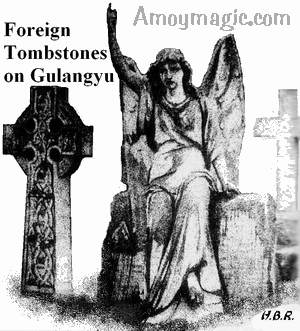
The doctors with stethoscope made careful examinations but his heart had
censed to beat, and our friend whom we loved so much had gone home to
rest. I at once sent a messenger to Mr. Pitcher, and then there was nothing
left for us to do but to care for the body and to isolate the room from
the rest of the house. Shortly after one o¡¯clock, Mr. Sullivan came with
a coffin, and we reverently placed the poor, tired body in it, and it
was carried off to the mortuary of the cemetery. Dr Otte during the day
had requested me specially to arrange for his burial in the missionary
cemetery, and not in the community cemetery. So Mr. Sullivan arranged
for the burial at daylight on Friday morning. A memorial service was held
in the large new London Mission Church, the largest place to seat an audience
on the island, at six o¡¯clock that evening. Of this meeting and the service
at the grave, I must let others write, for none of us felt that we could
attend lest we might spread the infection. We read the burial service
of our liturgy here, both for our own comfort and in memory of Dr Otte,
and that we might unite our prayers for his family and his friends.
![]() Back
to Top
Back
to Top
I am beginning to realise more and more how inadequate this letter is.
Still I feel that it is impossible to give you a complete account of these
last days of Dr Otte¡¯s life. I have tried to give you as detailed an
account as I could of the Doctor¡¯s illness. I hope it may give you some
comfort. In many ways his death was glorious. He was not afraid to die.
During the day, at one time he had just spoken to me about some arrangements
that should be made after his death. I told him not to be worried about
that, for it was not yet sure that he was g6ing to die. He replied at
once and with much vigor, ¡°I am not worried about dying, but you must
attend to these things for me.¡± His thoughts all through the day were
about his work here and about his family at home. In the evening, when
he was delirious he talked only Chinese. During the day, he kept urging
me that. I must surely write a good letter to you. The other things about
which he spoke were details of the mission treasureship and other local
business affairs, in which he wanted to help us in transferring them to
others. I need not trouble you about these. In his will he has made certain
definite bequests, and in addition to those he asked us only that his
small silver watch might be given to his faithful servant for so many
years, Koaira. Shortly after six o¡¯clock, as the three of us chanced
to be in the room at one time, he spoke to us and said he wished to say
goodbye. We protested, saying that he should not yet give up hope, but
as he seemed to desire him, we each gave him a hand which he took and
said good-bye, calling us each by name. After that he said but little,
and then only to ask the doctors to give him some medicine to ease his
pain. As he became delirious soon after seven o'clock he said no more
after that good-bye.
![]() Back
to Top
Back
to Top
As I have been thinking of the way in which Dr Otte died, it has seemed
to me more and more that if he could have chosen how he would die, he
would not have died otherwise than he did. He was taken by this disease
as he was faithfully performing his duty. It was as he was serving the
people to whom he had given his life for Christ¡¯s sake. He was taken
when he was still strong, when he was still full of ambition and full
of large plans for the future. But our Heavenly Father had other plans,
and He surely knows best, and the plans that the Doctor had are not forgotten,
altho they may be accomplished in another way. You will from others learn
of the sorrow evidences of sorrow that the Chinese and the foreigners
show. To have been so confined to the house, as we are still quarantined,
that we cannot see each of these, but we have even so soon enough to know
that this sorrow is very general and very deep. Poor David came three
times that Thursday evening, and when he heard the sounds of the Doctor¡¯s
heavy breathing, he got only as far as half way up our stairway, and could
not bear to come further. Mr. Peattle illegible] wrote this morning that
many of the Chinese were talking of some way in which they might raise
a memorial to the Doctor [see note and photo
on next page]. Marhal [illegible] was here for a moment this afternoon
and spoke of the same thing. We have told them that we cannot do anything
until your wishes have been consulted. I mention this only to show that
it is not only the mission and his American friends who miss him, but
it is the whole community that feels the loss very deeply.
![]() Back
to Top
Back
to Top
There may be others things about which I should write now, but which I
have been unable to think of. I shall try to include these in a letter
which will follow this very soon and in which I shall also write about
whatever action the Consul has taken. Dr. Otte¡¯s will has been given
to him. Mr. C. Dosker is named by the will as executor.
We are very thankful that up to the present moment none of us who were
exposed to the infection have developed any symptoms showing that we have
contracted the disease. On Friday evening we succeeded in getting some
curative serum from Dr. Paton in Chin-chew,¡ªit was sent in response to
our telegrams,---and wee were all then inoculated.
Our thoughts have been with you very much these days. It is impossible
to express in writing the feelings of sympathy which we have for you and
for the fatherless children. We ourselves too feel the personal loss very
keenly. We cannot understand now why this great blow should have fallen
on us. We can only bow in submission and pray for strength and comfort.
With all your friends, we unite our prayers that Our Father may fulfill
for you all of his loving promises.
I remain,
![]() Back
to Top
Yours very sincerely,
Back
to Top
Yours very sincerely,
[This "P.S."
was handwritten]
P.S. I want to assure you again
that we did everything that could be done for Dr. Otte. He was taken care
of from the moment he went to bed up to the very last in the very best
way possible. No effort of any kind was spared. But in the face of this
terrible disease it was all in vain ¨C We can only say [illegible] took
him ¨C who are we that we should ask why?¡ª A. Warnshuis
[Text of Otte Memorial on Gulangyu,
2007]
" Reverend Johannes Abraham Otte, M.D. 1861-
1910
¡°Born in Holland, educated in America, labored in China.
¡°The faithful use of his learning and skills in unwearied service made
him a man of far-reaching influence. He left his homeland to give himself
to the people of Amoy. Among them he labored with whole-hearted devotion
for twenty years, preaching the gospel of Jesus Christ, healing the sick,
building three hospitals, and training more than twenty medical students.
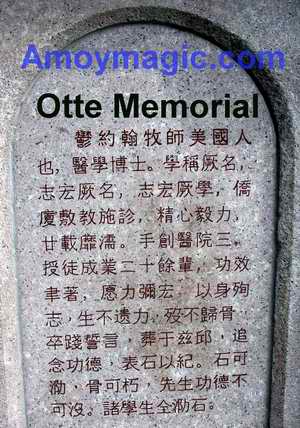 ¡°We
honor him as a man of great worth and unbending purpose. To accomplish
his purposes, which were large, he gave all his strength in life, he spared
not himself, and when he died his body was buried not in his homeland
but, as he wished, among the scenes of his labors. This monument is raised
by his students in memory of his character and deeds. This stone may crumble,
his bones may become dust, but his character and deeds are imperishable.¡±
¡°We
honor him as a man of great worth and unbending purpose. To accomplish
his purposes, which were large, he gave all his strength in life, he spared
not himself, and when he died his body was buried not in his homeland
but, as he wished, among the scenes of his labors. This monument is raised
by his students in memory of his character and deeds. This stone may crumble,
his bones may become dust, but his character and deeds are imperishable.¡±
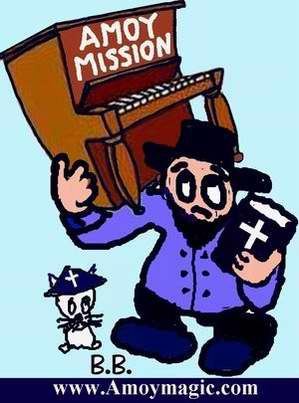 otos
for the website and upcoming book, or consider helping with the costs of
the site and research materials. All text and photos will remain
your property, and photos will be imprinted to prevent unauthorized use.
otos
for the website and upcoming book, or consider helping with the costs of
the site and research materials. All text and photos will remain
your property, and photos will be imprinted to prevent unauthorized use.
E-mail: amoybill@gmail.com
Snail Mail: Dr. William Brown
Box 1288 Xiamen University, Xiamen, Fujian PRC 361005
TRAVEL
LINKS  Favorite
Fujian Sites
Favorite
Fujian Sites  Fujian
Foto Album
Fujian
Foto Album  Xiamen
Xiamen
 Gulangyu
Gulangyu
 Fujian
Guides
Fujian
Guides  Quanzhou
Quanzhou
 Zhangzhou
Zhangzhou
 Longyan
Longyan
 Wuyi
Mtn
Wuyi
Mtn  Ningde
Ningde
 Putian
Putian
 Sanming
Sanming
 Zhouning
Zhouning
 Taimu
Mtn.
Taimu
Mtn.  Roundhouses
Roundhouses
 Bridges
Bridges
 Jiangxi
Jiangxi
 Guilin
Guilin
 Order
Books
Order
Books Readers'
Letters New: Amoy
Vampires! Google
Search
Readers'
Letters New: Amoy
Vampires! Google
Search
Last Updated: October 2007
AMOY
MISSION LINKS
![]()
![]() A.M.
Main Menu
A.M.
Main Menu
![]() RCA
Miss'ry List
RCA
Miss'ry List
![]() AmoyMission-1877
AmoyMission-1877
![]() AmoyMission-1893
AmoyMission-1893
![]() Abeel,
David
Abeel,
David
![]() Beltman
Beltman
![]() Boot
Family
Boot
Family
![]() Broekema,
Ruth
Broekema,
Ruth
![]() Bruce,
Elizabeth
Bruce,
Elizabeth
![]() Burns,
Wm.
Burns,
Wm.
![]() Caldwells
Caldwells
![]() DePree
DePree
![]() Develder,
Wally
Develder,
Wally
![]() Wally's
Memoirs!
Wally's
Memoirs!
![]() Douglas,
Carstairs
Douglas,
Carstairs
![]() Doty,
Elihu
Doty,
Elihu
![]() Duryea,
Wm. Rankin
Duryea,
Wm. Rankin
![]() Esther,Joe
& Marion
Esther,Joe
& Marion
![]() Green,
Katherine
Green,
Katherine
![]() Gutzlaff,
Karl
Gutzlaff,
Karl
![]() Hills,Jack
& Joann
Hills,Jack
& Joann
. ![]() Hill's
Photos.80+
Hill's
Photos.80+
..![]() Keith
H.
Keith
H.![]() Homeschool
Homeschool
![]() Hofstras
Hofstras
![]() Holkeboer,
Tena
Holkeboer,
Tena
![]() Holleman,
M.D.
Holleman,
M.D.
![]() Hope
Hospital
Hope
Hospital
![]() Johnston
Bio
Johnston
Bio
![]() Joralmans
Joralmans
![]() Karsen,
W&R
Karsen,
W&R
![]() Koeppes,
Edwin&Eliz.
Koeppes,
Edwin&Eliz.
![]() Kip,
Leonard W.
Kip,
Leonard W.
![]() Meer
Wm. Vander
Meer
Wm. Vander
![]() Morrison,
Margaret
Morrison,
Margaret
![]() Muilenbergs
Muilenbergs
![]() Neinhuis,
Jean
Neinhuis,
Jean
![]() Oltman,
M.D.
Oltman,
M.D.
![]() Ostrum,
Alvin
Ostrum,
Alvin
![]() Otte,M.D.
Otte,M.D.![]() Last
Days
Last
Days
![]() Platz,
Jessie
Platz,
Jessie
![]() Pohlman,
W. J.
Pohlman,
W. J.
![]() Poppen,
H.& D.
Poppen,
H.& D.
![]() Rapalje,
Daniel
Rapalje,
Daniel
![]() Renskers
Renskers
![]() Talmage,
J.V.N.
Talmage,
J.V.N.
![]() Talman,
Dr.
Talman,
Dr.
![]() Veenschotens
Veenschotens
. ![]() Henry
V.
Henry
V.![]() Stella
V.
Stella
V.
. ![]() Girard
V.
Girard
V.
![]() Veldman,
J.
Veldman,
J.
![]() Voskuil,
H & M
Voskuil,
H & M
![]() Walvoord
Walvoord
![]() Warnshuis,
A.L.
Warnshuis,
A.L.
![]() Zwemer,
Nellie
Zwemer,
Nellie
![]() Fuh-chau
Cemetery
Fuh-chau
Cemetery
![]() City
of Springs
City
of Springs
(Quanzhou, 1902!!)
![]() XM
Churches
XM
Churches ![]()
![]() Church
History
Church
History ![]()
![]() Opium
Wars
Opium
Wars
![]() A.M.
Bibliography
A.M.
Bibliography
![]() YMCA
Volunteer!
YMCA
Volunteer!
![]() XICF
Fellowship
XICF
Fellowship![]()
![]() Temples
Temples![]()
![]() Mosques
Mosques
![]() Christ
in Chinese
Christ
in Chinese
Artists'
Eyes
DAILY LINKS
![]() FAQs
Questions?
FAQs
Questions?
![]() Real
Estate
Real
Estate
![]() Shopping
Shopping
![]() Maps
Maps
![]() Bookstores
Bookstores
![]() Trains
Trains
![]() Busses
Busses
![]() Car
Rental
Car
Rental
![]() Hotels
Hotels
![]() News
(CT)
News
(CT)
![]() Medical
& Dental
Medical
& Dental
![]() Expat
Groups
Expat
Groups
![]() Maids
Maids
![]() Phone
#s
Phone
#s
EDUCATION
![]() Xiamen
University
Xiamen
University
![]() XIS(Int'l
School)
XIS(Int'l
School)
![]() Study
Mandarin
Study
Mandarin
![]() CSP(China
Studies)
CSP(China
Studies)
![]() Library
Library
![]() Museums
Museums
![]() History
History
DINING ![]() Tea
Houses
Tea
Houses
![]() Restaurants
Restaurants
![]() Asian
Asian
![]() Veggie
Veggie
![]() Junk
Food
Junk
Food
![]() Chinese
Chinese
![]() Italian
Italian
![]() International
International![]()
![]() Visas
4 aliens
Visas
4 aliens
RECREATION
![]() Massage!
Massage!
![]() Beaches
Beaches
![]() Fly
Kites
Fly
Kites
![]() Sports
Sports
![]() Boardwalk
Boardwalk
![]() Parks
Parks
![]() Pets
Pets
![]() Birdwatching
Birdwatching
![]() Kung
Fu
Kung
Fu ![]() Hiking
Hiking
![]() Music
Events
Music
Events
![]() Cinema
Cinema
![]() Festival&Culture
Festival&Culture
![]() Humor&
Humor&![]() Fun
Fotos
Fun
Fotos![]()
BUSINESS
![]() Doing
Business
Doing
Business
![]() Jobs!(teach/work)
Jobs!(teach/work)
![]() Hire
Workers
Hire
Workers
![]() Foreign
Companies
Foreign
Companies
![]() CIFIT
(Trade Fair)
CIFIT
(Trade Fair)
![]() MTS(Translation)
MTS(Translation)
![]()
Back to Top
